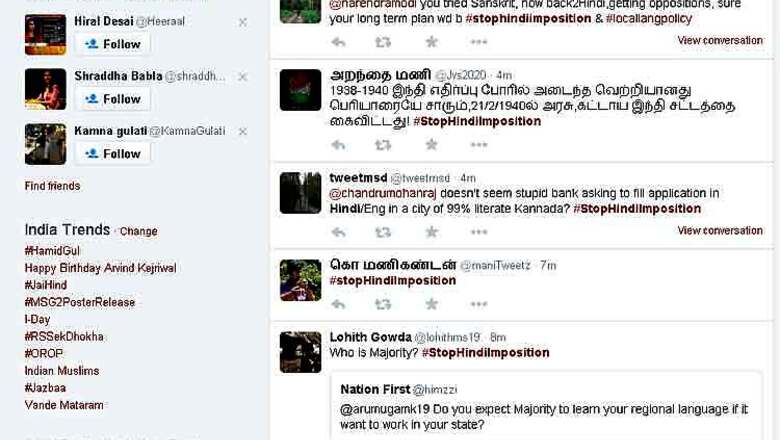
views
On the occasion of 69th Indian Independence day, we all need to remember that this day was achieved by the sacrifices and struggles of millions of people across various parts the sub-continent. There were people from all regions of India in the freedom struggle. People living in erstwhile independent colonies like that of the Mysuru agreed to join the Indian union post-independence with a hope that there would be one country formed on the lines of equality and we all shall equally benefit from democracy since it would be self-rule. Recalling Mahatma Gandhi's words - "Good governance is not a substitute for Self-governance". Hence the expectation from the unified India, independent from British rule was clearly "self-rule". But today, when we retrospect on the way the Union government has functioned in the past 7 decades, self-rule still seems to be a myth for non-Hindi speakers since the Union-government does not speak their language.
The Indian Constitution was framed with an oath to secure to all its' citizens - Justice, Liberty, Equality and Fraternity. But the Articles 343-351 of the Indian Constitution declares that only Hindi and English shall prevail as the official languages of Indian Union thereby contradicting with the preamble which vows to assure justice, liberty, equality and fraternity. Further, the Official Languages Act makes it the duty of the Central government to effectively implement this flawed language policy. The language policy of the Indian Union has put millions of Indians from non-Hindi regions to disadvantage in their interactions with the Union government. Banks, post offices, railways, insurance, airways, passport - all departments operating under the Union list follow the language policy of the Union government and hence use Hindi and English only in their day to day transactions. Not just that, but Central government employees in non-Hindi regions are rewarded for using Hindi in their day to day transactions and administration. Union government does not carry out such promotional activities for any other Indian language apart from Hindi.
A common man in Karnataka visiting a bank/post office in any part of his own state for any transactions, will have to face a language barrier. From application forms to cheques, display panels and ATMs, Hindi and English languages find place but the language of the people of the land is largely ignored. Indian Railways operating within Karnataka does not provide basic services like passenger tickets and safety information in Kannada, but Hindi and English are used everywhere. The passport of an Indian carries Hindi/English in place of individual's own language.
The root cause of all these problems is the fact that only Hindi and English are given official status in the Indian Union. Non-Hindi speakers are treated as second-grade citizens in their own land by the Union government. This form of discrimination meted out towards non-Hindi speakers has brought millions of Indians to question as why can't we have linguistic equality in India? A common interest group which pondered around this question formed an online community called "Promote Linguistic Equality (PLE)" in Facebook in the year 2013. The group now has more than 8,000 members hailing from all parts of India. This Independence day, several members of the PLE group decided to highlight this issue on Twitter using the hashtag "#StopHindiImposition". People from across India actively responded in this TweetUp contributing to thousands of tweets under this hashtag. Indians from various linguistic communities in India are voicing for the same cause - "Promote Linguistic Equality".
The Union government can address this issue of linguistic inequality by declaring all 22 schedules languages as the Official languages of the Indian Union. That way the promises made in the preamble of the Indian Constitution would also be honoured and democracy would prevail in its truest spirit.
(Author Vallish Kumar S is a Bengaluru based writer. He believes in Mother Tongue first policy)













Comments
0 comment